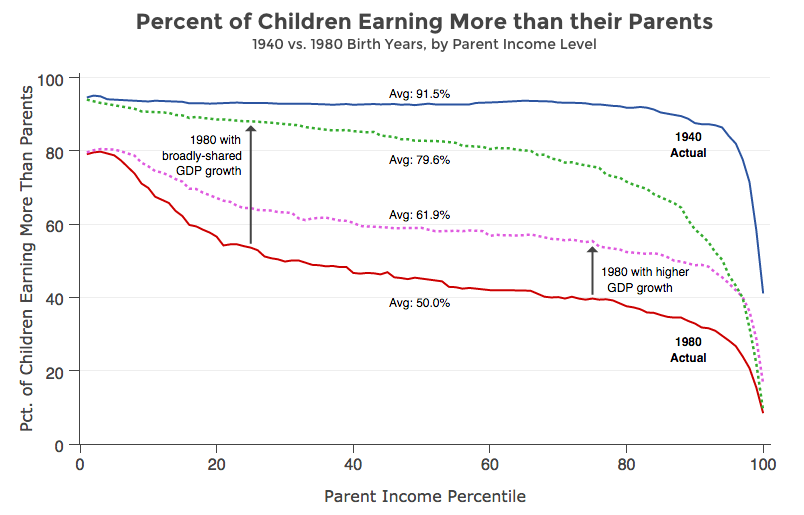Today's Youth Have a Problem Few Other Generations Have Faced

By:
The American Dream has been dying a slow, steady death since the 1940s, according to first-of-its-kind research from a team of economists at Stanford University, which was published Thursday.
Researchers used census data to determine the likelihood that Americans born in 1940 and subsequent decades could expect to earn more than their parents — a metric that's meant to represent the "American Dream," The New York Times' David Leonhardt wrote.
The more likely a generation is to out-earn their parents, the more vibrant the American Dream, the research presupposes.
 Flickr / Pen Waggener - flickr.com
Flickr / Pen Waggener - flickr.com
Virtually every person, regardless of their social standing or educational attainment, ended up earning as much or more than their parents if they were born in 1940, but those chances have gradually diminished over time.
This graph sums up the researchers' findings.
Ninety-two percent of Americans born in 1940 out-earned their parents; 79 percent out-earned their parents ten years later; just over 60 percent of those born in 1960 and 1970 out-earned their folks; and only half of those born in 1980 could expect to achieve the American Dream. But why?
The reason for the decline in mobility comes down to two main factors: national economic growth (in terms of gross domestic product) and economic equality. That said, the researchers argued that the latter factor is more influential:
"Most of the decline is due to the more unequal distribution of economic growth in recent decades rather than the slowdown in GDP growth. Increasing economic growth rates to the higher levels experienced in mid-century America would increase the fraction of children earning more than their parents to 62 percent. Spreading the existing growth more broadly across the income distribution would raise the level to 80 percent."
This chart illustrates that point.
 The Equality of Opportunity Project - equality-of-opportunity.org
The Equality of Opportunity Project - equality-of-opportunity.org
They argue that, according to their research, boosting GDP growth would only increase the 1980 co-hort's chance of out-earning their parents to 62 percent. However, if income distribution levels were equalized, 1980 group would have an 80 percent chance of living the American dream. In short, boosting GDP helps a little, solving inequality helps a lot.
However, there's some dispute over the data Stanford University economist Raj Chetty and his team used to estimate the financial prospects of later generations.
In a blog post, French economist Vincent Geloso wrote that researchers exaggerated the problem by underestimating how much the parents of people born in 1940 made, and overestimating the income of parents to children born in 1980. "I am not sure that the drop is as dramatic as many are making it out to be," Geloso concluded; but he didn't deny that the overall trend was correct.
ATTN: reached out to Chetty for comment, but he wasn't immediately available. We'll update this story when we hear back.
